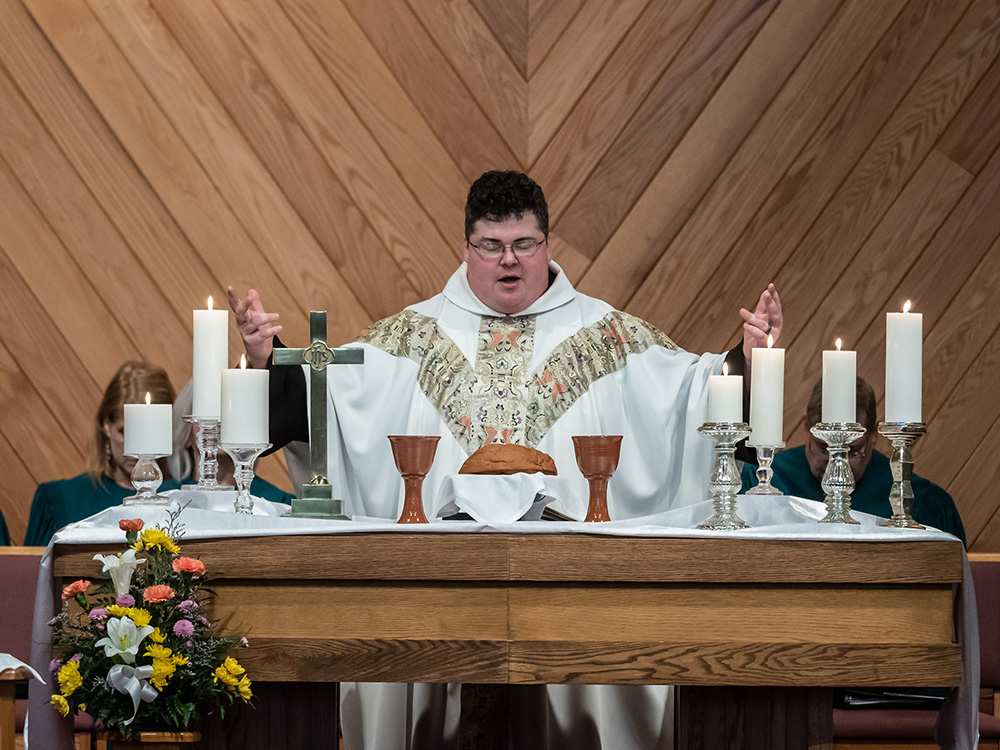United Methodist pastor’s podcast ‘Cross Over Q’ challenges QAnon, comforts its victims
By Emily McFarland Miller | Religion News Service
Vicar Derek Kubilus hoped the conspiracy theories would calm down after the 2020 election passed and an apocalyptic event known as “The Storm” didn’t happen.
But then came the cries of election fraud — the insistence former President Donald Trump had been cheated out of his win by a tangled web of ballot machines switching votes and paper ballots being trucked into polling places in the dark of night.
All of these theories were ultimately found baseless or proved false. Courts in various states dismissed all election fraud cases due to lack of evidence. The votes were certified. And Kubilus thought that was surely the end.
But then on Jan. 6, a deadly insurrection broke out at the U.S. Capitol, with many of those storming the building claiming election fraud and waving banners with nods to various conspiracy theories circulating online.
And even after the inauguration of President Joe Biden — when it was clear all of the prophecies had amounted to nothing — the constellation of conspiracy theories known as QAnon continues to grow and change.
“The overall conspiratorial frame of mind is more popular now than it’s ever been, in my opinion,” said Kubilus, who leads a small United Methodist church in northeastern Ohio.
In late January, the vicar launched a podcast called “Cross Over Q” to open a conversation about QAnon with his fellow Christians, who number among Q’s adherents.
A recent survey by the conservative American Enterprise Institute found 27% of white evangelicals believe the widely debunked conspiracy theory at the heart of QAnon — that former President Donald Trump is secretly battling a cabal of pedophile Democrats — is completely or mostly accurate. That’s followed by 18% of white Catholics and 15% of white mainline Protestants.

In the first episode of his podcast, Kubilus describes QAnon as “the most violent and dangerous Christian heresy to come along this century.”
“It’s damaging lives. It’s damaging families. More than that, it’s also damaging our witness to the world,” he told Religion News Service.
When he first heard about the conspiracy theory in 2018, Kubilus said, he thought it was “just a silly thing” and would blow over soon — like theories about lizard people or the satanic panic that gripped the 1980s.
Then came Jan. 6, and, he said, “I knew I needed to start somehow addressing the problem.”
“I didn’t know what shape that was going to take quite yet. But when I saw, you know, Confederate flags, Q flags and crosses being marched up into the Capitol, I understood there was an issue there,” he said.
Kubilus already was producing a podcast, sharing his sermons with congregants who weren’t able to physically attend church during the COVID-19 pandemic, so it seemed like a natural place to start.

In its six episodes to date, “Cross Over Q” has explored where QAnon started, how it draws upon old antisemitic tropes and what to do when it feels like a loved one is “trapped in a cage of conspiracy.”
The podcast host is quick to admit he’s not an expert, but as a clergyman, he noted in one episode, he is concerned with “healing the sick and binding up the brokenhearted among us” and ultimately with redemption.
And it’s important for the church to confront QAnon because it’s hurting people, according to the vicar.
He’s heard from one clergyperson who was forced to leave their church. He’s heard from listeners who planned to leave their spouses, who have cut off relationships with their parents or children over their beliefs in conspiracy theories associated with QAnon, which have extended to the pandemic and convinced some to forgo mask wearing and vaccination.
It’s also hurting the church when, years from now, people will associate Christianity with QAnon, he said.
“The tie actually comes in with Christian nationalism — that’s the cord that binds QAnon to the church,” Kubilus said.
“The fact people think of their patriotism in specifically religious terms allows something like QAnon to manipulate Christians and allows Christians to say, ‘Hey, look, if you’re not into this, if you’re not fighting against this, then you’re not fighting for the kingdom of God.’”
The heads of the Episcopal Church and the Evangelical Lutheran Church in America joined the Baptist Joint Committee for Religious Liberty in late January for a webinar on responding to Christian nationalism. The Episcopal Church also produced a resource called “Misinformation, Disinformation, Fake News: Why Do We Care?” last year.
But Kubilus hasn’t heard many pastors speaking out against QAnon, perhaps because of the political stigma attached that he said is hard for clergy to navigate. It’s not a political problem, though, he said. It’s an epistemological problem.
“This has moved beyond the level of ‘we shouldn’t talk about politics at dinner,’ or, you know, ‘my uncle can be really insufferable at Thanksgiving,’” he said.
The vicar said he plans to present a resolution to the East Ohio Conference of the United Methodist Church about confronting QAnon and walking alongside its victims.
And he’s mapped out four more episodes of his podcast.
“I’m gonna do my 10 episodes, and that’s my contribution to the effort,” he said. “I’ll still continue to work for it in my conference and in my congregations, but I don’t know that beyond that I have much to add to the sort of wider social conversation.”
The podcast caught the attention of “60 Minutes,” which featured Kubilus in a segment about QAnon in February. And Kubilus has heard from some podcast listeners who have been moved to address QAnon in their own congregations.
“That makes the entire thing worth it right there,” he said.






